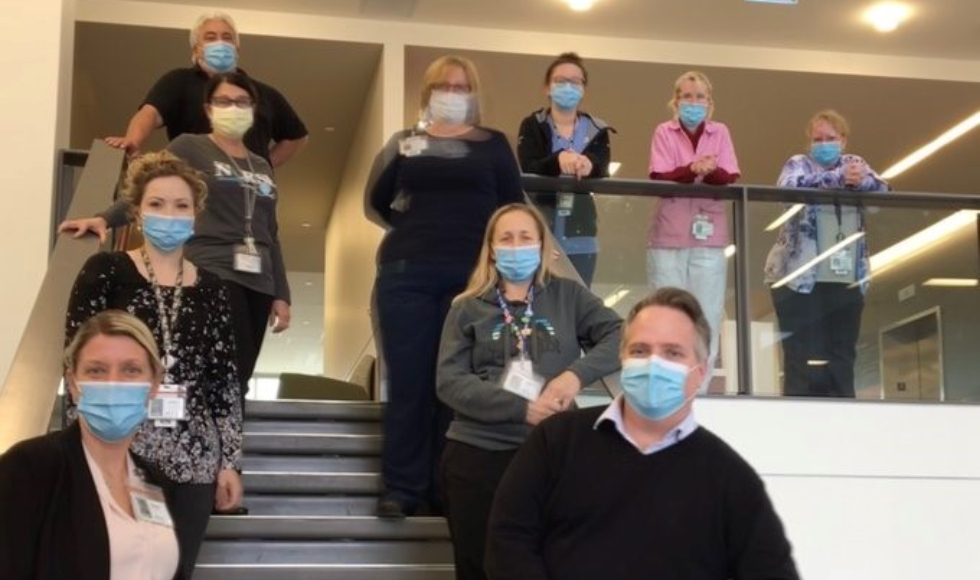Hamilton Health Sciences and McMaster launch national post-operative virtual care study

Jennifer Lounsbury (front left), Hamilton Health Sciences virtual nursing team lead and Michael McGillion (front right), co-investigator, with the HHS virtual nursing team.
June 18, 2020
A team of researchers and health care providers at Hamilton Health Sciences (HHS) and McMaster University have launched a major Canadian study to remotely manage patients after surgery. Their joint research centre, Population Health Research Institute (PHRI), is testing virtual care and remote monitoring technology.
Nurses run the central command centre and use a tablet computer to virtually interact with patients. They can also connect patients to physicians through virtual linkage. The patients use simple remote monitoring technology to record their vital signs at home, which are sent instantly to the nurse.
Patients are at highest risk for complications in the first month after surgery, with 15-20 percent returning for emergency treatment or hospitalization. The trial, called “Post-discharge after surgery using virtual care with remote automated monitoring (PVC-RAM),” will evaluate the effect of a virtual care and remote monitoring technology on unplanned hospitalizations and emergency department and acute care visits. It builds on the team’s previous research into remote monitoring of vital signs.
“When COVID-19 restrictions came into effect in early March, hospitals were challenged to drastically reduce non-emergency care. Taking vital signs is an important part of care in hospital, so it stands to reason that taking patients’ vital signs virtually from home makes a lot of sense, especially in patients who are at high risk for complications,” said Dr. P.J. Devereaux, cardiologist at HHS, professor of medicine at McMaster, senior scientist at PHRI, and co-principal investigator of the trial.

“If we can reduce the numbers of re-admissions, we can increase our capacity to do more elective and urgent surgeries. Especially since patients transition home sooner after surgery, globally remote patient monitoring is going to be the way of the future,” said Michael McGillion, assistant dean, research, School of Nursing at McMaster, a scientist at PHRI and co-principal investigator of the trial.
The study is recruiting 900 adults across Canada who have undergone semi-urgent cancer surgeries, urgent surgeries such as hip fractures, or emergency surgeries such as a ruptured abdominal aortic aneurysm.
Patients receive technology called Connected Health by Cloud DX, which includes a tablet and remote monitoring equipment to assess six biophysical parameters: blood pressure, heart rate, respiratory rate, oxygen saturation, temperature, and weight.
Nursing staff teach patients how to use the equipment before they are discharged from hospital. Then, for thirty days after surgery, patients take their vital signs and complete daily surveys that assess their recovery. Data is relayed wirelessly to the virtual nursing station at HHS where nurses assess the data and conduct secure virtual video visits.
If data shows issues or if a patient needs help, they have access to their nurse and physician 24 hours a day, seven days a week through two-way secure video linkage or texting.
For Ernst Seeger from Niagara, participating in the study has given him a feeling of security knowing that his care team is a click away.
“I had a concern on a Saturday night at 10 p.m. I was stubborn at first, but finally my wife made me call my team. I had a video assessment with my doctor that night and he ordered prescriptions for me,” said Seeger. “I didn’t have to leave my home.”
Trial participants who are not randomized to receive virtual nursing station care receive the current standard care which is at the discretion of the surgeon. Typically, this care includes an in-person clinic visit in two to eight weeks after discharge from the hospital.
“As healthcare consumers, we have to be able to work in partnership with patients and families to offer alternative approaches to care,” said Jennifer Lounsbury, trial collaborator, a chief of inter-professional practice at HHS and assistant clinical professor, School of Nursing at McMaster.
“The virtual nursing station approach to care allows us to connect with patients and help them seek any needed medical treatments earlier than they otherwise would have.
“As one of our patient and family advisory council members recently told us, ‘The time for change is now,’” she added.
Participating hospitals include Hamilton Health Sciences, St. Joseph’s Healthcare Hamilton, London Health Sciences, Kingston Health Sciences, The Ottawa Hospital, Winnipeg Health Sciences and University of Alberta Hospital.
Seed funding for the PVC-RAM trial was received through Roche Canada’s COVID-19 Innovation Challenge.


